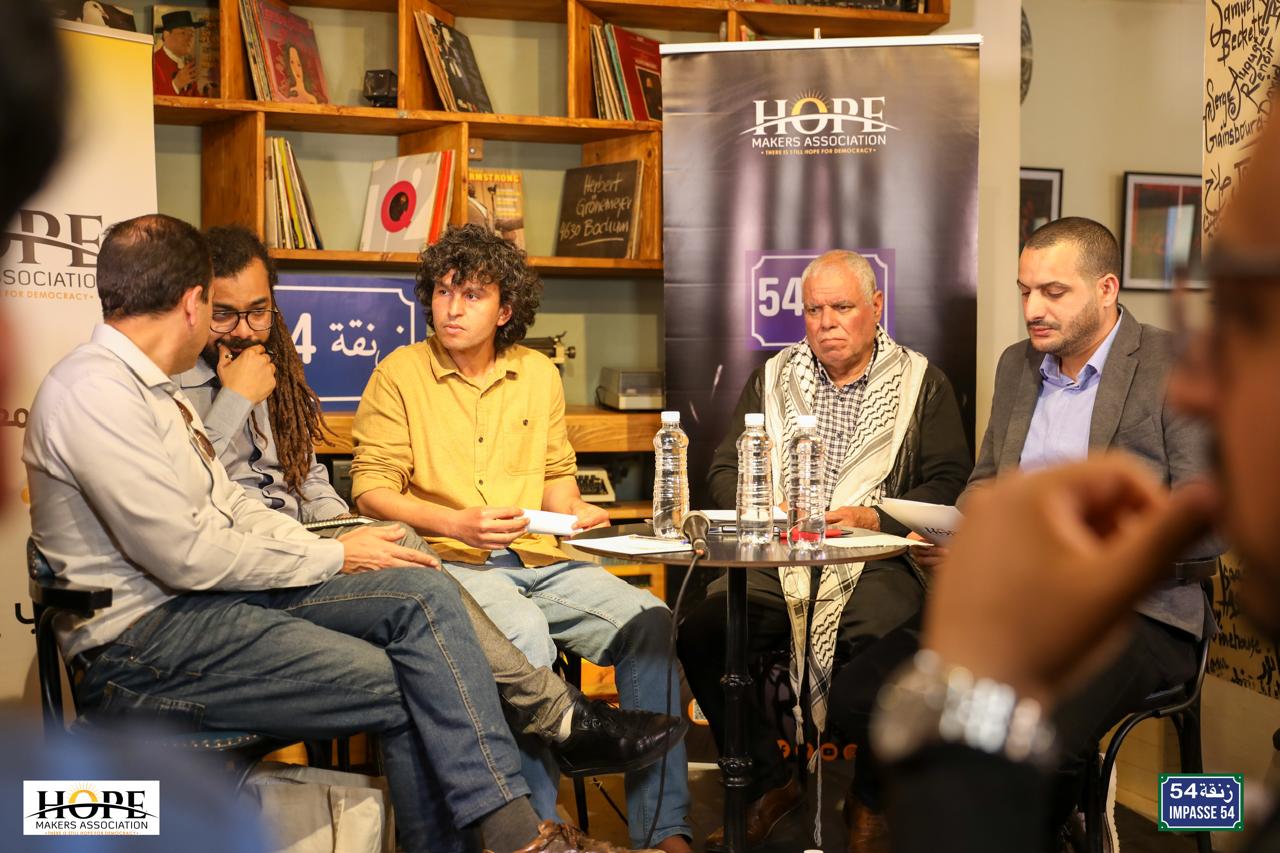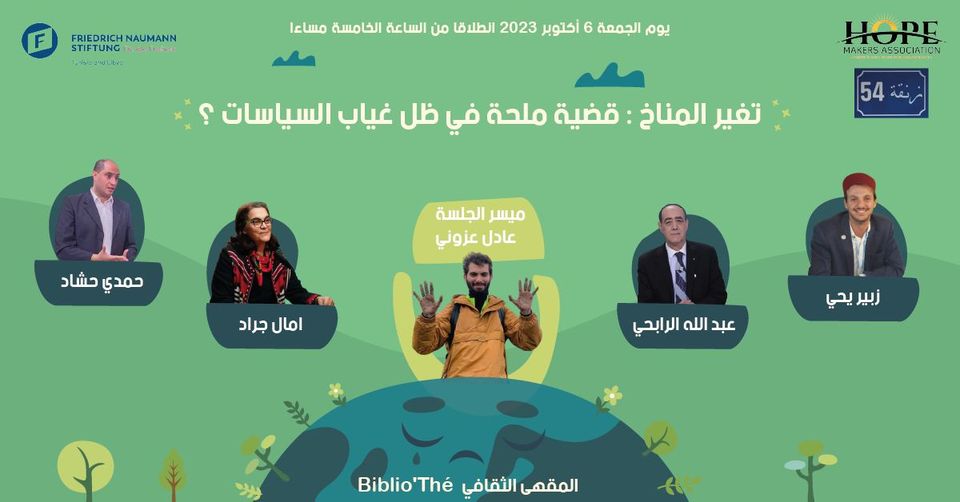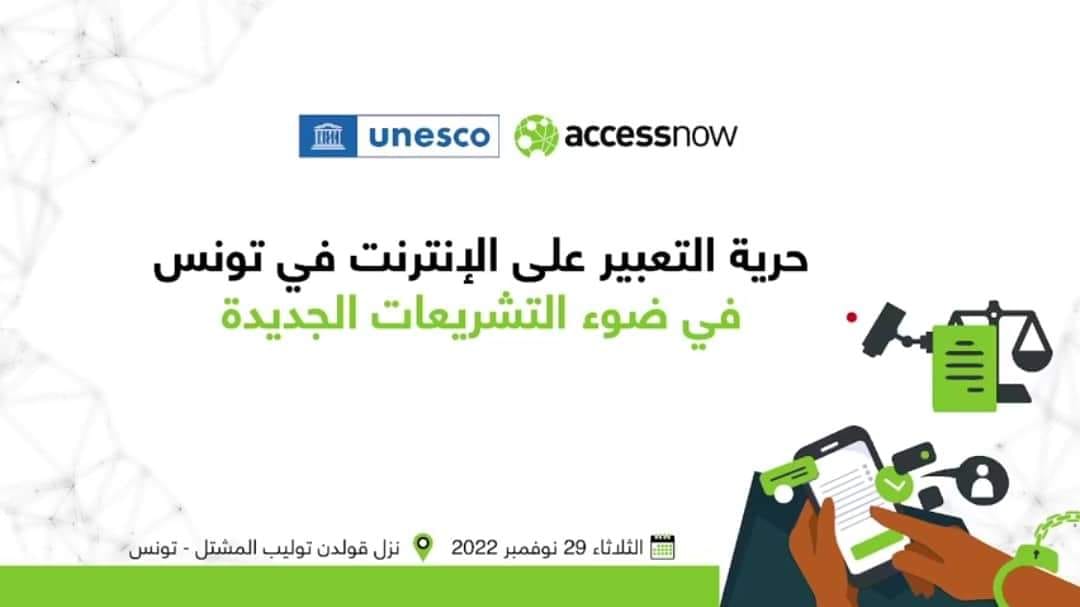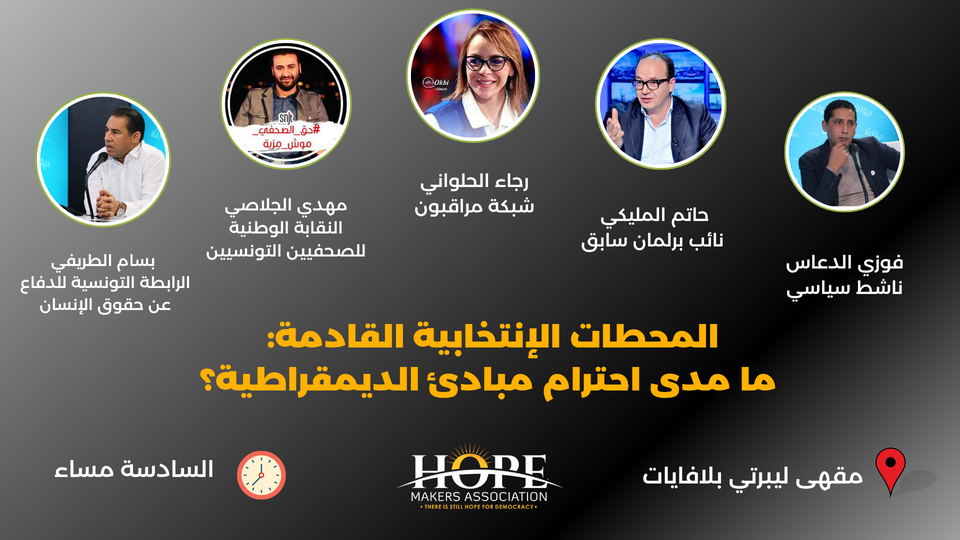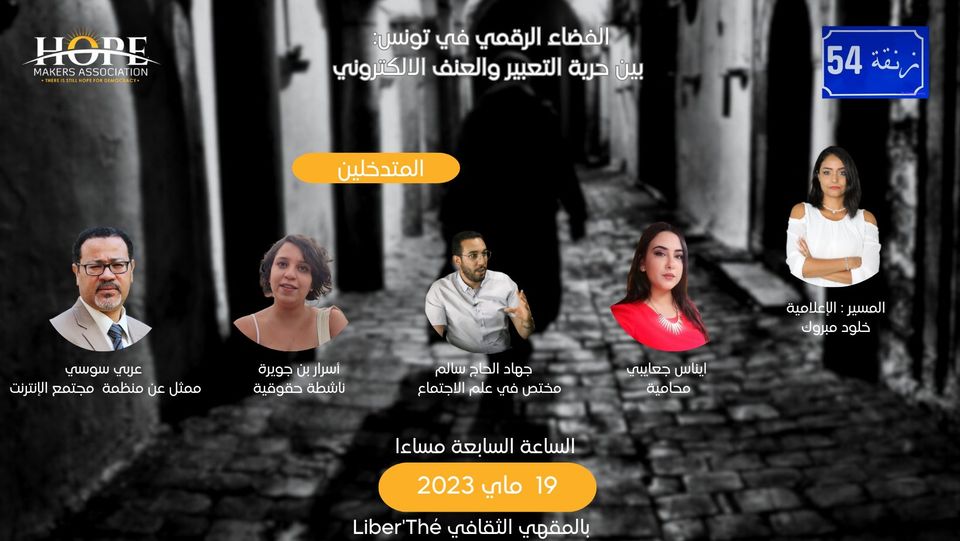Hope Makers /
Coinciding with the discussion of a proposed constitutional law regarding the regulation of associations within the Committee on Rights and Freedoms in the Tunisian Parliament, which aims to amend Decree 88 and the controversy surrounding this issue, the "Hope Makers" association organized, as part of its "impass 54" project, a discussion session entitled: "Civil Society and the State: Any Future for the Relationship?" This took place on Tuesday, April 16, 2024, at the cultural café "Liberty", addressing several aspects revolving around the formation of civil society between comparative experiences and the Tunisian experience, the role of civil society in enhancing and consolidating democracy: gains and challenges, Decree 88 of the year 2011: evaluating the role of the decree in regulating civil society in Tunisia. The discussion in this context revolved around the need to amend Decree 88 of the year 2011, the motives and reasons behind amending the decree, and guarantees to enhance the role of civil society.
The discussion focused on the performance of civil society, its regulatory legislative framework, and the future challenges regarding financing and mechanisms of operation after the measures of July 25, by addressing the role of civil society in economic, social, and political fields from 2011 until today.
The member of the National Union of Tunisian Journalists, Karim Wannas, who moderated the dialogue session, stated that organizing associative work within the framework of civil society is an old but renewed topic that is now open for public discussion due to developments threatening its existence.
Political science researcher Khalil Arabi, at the beginning of the session, provided classical and contemporary definitions of civil society according to political and cultural theories...
He stated that the concept of civil society, in its connection to democracy, assumes the existence of a participatory relationship between individuals and institutions that strive to monitor the state for the public interest.
Khalil Arabi explained that after the revolution, the concept of civil society expanded, becoming an ideological and cultural phenomenon that mediates surveillance and transforms into an advocate for its own interests for the public good...
However, he pointed out that in the current context, the lack of recognition of the existence of civil society raises the issue of independence and how to represent the public interest.
According to Khalil Arabi, in the current mindset of the authorities, establishing civil companies based on the concept of volunteering and solidarity serves as a substitute for the philosophy of civil society.
Deputy Mohammed Ali, the rapporteur of the Committee on Rights and Freedoms, questioned, "Is there a need to amend Decree 88?"
Since the controversial point regarding the amendment of the Associations Decree revolves around foreign funding and surveillance, Mohammed Ali highlighted that there are mechanisms to monitor suspicious funding through the Financial Analysis Committee at the Central Bank and the provisions of Decree 88, which imposes penalties for civil society violations.
Mohammed Ali acknowledged that there are associations that have committed violations in terms of spending and financing, allowing some parties to reach power... but this is due to how associations are dealt with and the lack of law enforcement, emphasizing the necessity of independence for the civil society system from the state.
Mohammed Ali praised the role of civil society after 2011, stating that associations engaged in the greatest battle by refusing the status quo through civil efforts in the fields of rights, freedoms, development, and during the COVID-19 crisis...
He continued, "Today, after the new proposal has become a reality, we must engage in a battle similar to the Decree 54 battle, which is a peaceful civil battle in belief in democracy and freedom of expression."
The deputy called for work within the Committee on Rights and Freedoms to ensure the essence of Decree 88 is not violated and to not interfere with the freedom of forming associations by finding a better legal formulation for the new proposal.
He also mentioned that the government and representatives of civil society will be invited to present their stance on the changes affecting Decree 88.
On his part, the director of the Kwaakibi Center for Democratic Transitions, Amin Ghali, considered the proposed project as invalidating Decree 88, aiming to amend about 40 articles to empty the law of its core freedoms and change all its contents...
Amin Ghali pointed out in this regard that there are between 9 and 11 laws regulating the work of associations, including anti-corruption laws, terrorism laws, and the national law for institutions... and there are 13 entities from state structures monitoring the work of associations, confirming that the inability to monitor indicates a flaw in these structures...
Amin Ghali believes that the legal framework is sound and very good according to assessments from international bodies, and Decree 88 is among the top 10 laws in the world, calling for the reform of law enforcement rather than the law itself...
According to a study conducted by the Kwaakibi Center on associations, there are 40 cases for closing associations.
Regarding the relationship of associations with terrorism, Amin Ghali emphasized that the counter-terrorism committee has the authority to freeze assets and funds of any entity in Tunisia based on suspicion, and there are only 4 associations on these lists, meaning the suspicion is not strong. And in the Financial Analysis Committee: there is only one association under suspicion...
Amin Ghali also addressed the importance of maintaining the legal framework for associations, mentioning that in 2020, associations worked with the state and improved sovereign ranking in combating the danger of the association sector. He pointed out that changing the law could lead to a decline in Tunisia's sovereign ranking.
According to scientific assessments, civil society contributes 1.6% of the gross national product in the Tunisian economy and provides approximately 80,000 jobs.
Amin Ghali concluded that Tunisia is open to the outside world and accessing foreign funding for associations in Tunisia is a guaranteed right in Decree 88 with controls and transparency. Associations that err can be transparently monitored.
Representative from the organization "My Association", Ali Bouzid, called for reconsidering the role of civil society from 2011 to the present, considering that civil society has abandoned its role after the measures of July 25, 2021.
Ali Bouzid demanded opening a discussion to create new initiatives and present visions and initiatives regarding civil society to the authorities, and to regain more independence by finding new formulas for financing away from foreign funding, independence from political authority, and repositioning.

